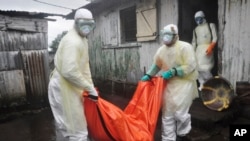British, French and American troops are on the ground in West Africa to build infrastructure to fight the region’s deadly Ebola outbreak. So, too, are several United Nations agencies, led by the Security Council-approved UN Mission for Emergency Ebola Response. But is it enough to stop the outbreak that’s killed more than 4,000 people across the region?
Aboulaye Mar Dieye heads up the United Nations Development Program’s operations in Africa. He tells Voice of America’s Chris Stein about what more needs to be done, when the outbreak might be over, and why this Ebola outbreak is like fighting a war.
Stein: I’d like to start by asking we’ve seen in the recent weeks and months an increased international response to the Ebola outbreak in West Africa, the deployment of troops from the US, UK and France to help coordinate logistics, as well as the launch of the UN mission. Is that response enough?
Mar: We have realized that the disease is moving exponentially, while we are running on a linear track. We’re not catching. It’s beating us. And if we do not deal with it as the Security Council recognized quoting chapter seven of the charter, this is an international threat, and we have to deal with it internationally. That’s why we are putting maximum capacity on the ground from the international community under the leadership of UNMEER, the UN mission for emergency response to the deal with the Ebola crisis. That’s the reason, it’s the urgency of the moment that is holding the need for putting all our forces on the ground to defeat this epidemic, and it is defeatable.
Stein: Are enough forces on the ground right now, to defeat the virus?
Mar: This is a step forward, and you have listened lately to the president of the bank, World Bank, who is saying that we need more, and the secretary general yesterday said that we need even more to deal with this stuff. And so this is a call for action. All of us have to chip in to defeat this virus. So it’s never enough because this is unprecedented. We don’t master the fundamentals of this crisis, we are just responding to the acuity of the crisis but we are not seeing yet the end of the tunnel. That’s why the only strategy we have for the time being is to try to catch up and try to defeat it.
Stein: There’s been some concern lately that the virus and the upheaval it’s causing in these communities might end up destabilizing some of these countries. How likely do you see that possibility?
Mar: These are three countries that are still fragile, but they’re doing great, after coming out of the social crisis, political crisis, conflicts and so on and so forth, they’re having impressive economic results. A country like Guinea was cruising at 4.9 percent GDP growth rate. A country like Liberia, about five percent growth rate. A country like Sierra Leone even took 11 percent growth rate. This is the very first time we are seeing a drop in GDP to the tune of three, four, five points. It’s huge. You don’t see those kinds of drop often. You only see them in conflict situations. It shows that this is a conflict situations.
Stein: There are a number of different agencies, both UN and otherwise working on this epidemic. You know between the foreign military forces as well as the UN and humanitarian response. Is there anyone that is coordinating all of these actors.
Mar: The very fact that we have created UNMEER, the United Nations mission for emergency response for the Ebola is that we needed coordination. We had many actors, goodwill actors investing on the ground. At the moment we had this onset of the crisis, there were no coordination on the bigger scale. One of the purpose of UNMEER is to have leadership on the ground accepted by everybody and that is that we coordinate not only the UN but serve as a platform for coordination for everybody.
Stein: I understand that other countries in the sub region are taking steps to prepare themselves for if an Ebola case arrives in their borders. How inevitable is it that the virus will spread beyond the three most-affected countries right now.
Mar: This disease can travel easily. Because we are in the sub region with borders that are porous and a huge mobility because this community ECOWAS, the economic community for West Africa has agreed on the free movement of people. And that’s a factor that is playing in favor of this disease. Remember it started around December in a very small village around Guéckédou but like white fire it detached Sierra Leone and Liberia simply because people can move freely. There are virtually no frontiers in the sub region. And that’s why we have to prepare.
Stein: Can we say at this point when this Ebola outbreak might be over?
Mar: It’s difficult but the plan we have is we have to deal with in the next two, three months. Because if we don’t, this is the prediction of the CDC Center of Disease Control in the US is saying. If we don’t by January these numbers can hit 500,000 infected. Now are about 8,000. And that can be a trigger point to catastrophe. That’s why for me it’s the scenario that we cannot contemplate. It behooves us all international community to stop it. It is stoppable, we just have to step up the means.




